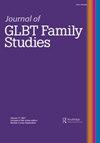Childless Bisexual and Gay Men’s Expectations of Obstacles and Enabling Factors for Pursuing Parenthood
IF 2
Q2 FAMILY STUDIES
引用次数: 1
Abstract
Abstract This article concerns childless bisexual and gay men’s expectations of potential future fatherhood. Social context, biological prerequisites and legal restrictions have in previous research proven to be complicating factors in the process of starting a family. This article investigates the experience of 14 bisexual and gay men in Sweden who are contemplating parenthood. Semi-structured interviews were conducted. The interviews were analyzed using grounded theory methodology, resulting in a model that identified obstructing and enabling factors in realizing future parenthood. The path to parenthood was seen as a process containing both the decision to pursue parenthood and the belief that parenthood was a possibility. The process toward parthood was not linear, but a pendular movement, affected by obstructing factors and enabling factors. One of the main findings was the experience of invisibility in relation to involuntary childlessness amongst bisexual and gay men. Simultaneously, the possibility to break this invisibility, to become a parental role model for other bisexual and gay men, and to revise images of the nuclear family were strong motivating factors. The findings are discussed in relation to Swedish gay men and fathers’ social situation.无子女双性恋和男同性恋对追求为人父母的障碍和促成因素的期望
摘要本文关注无子女的双性恋和男同性恋对未来潜在父亲身份的期望。先前的研究证明,社会背景、生物学先决条件和法律限制是组建家庭过程中的复杂因素。本文调查了瑞典14名考虑为人父母的双性恋和男同性恋者的经历。进行了半结构化访谈。访谈采用扎根理论方法进行分析,得出了一个模型,确定了实现未来为人父母的障碍和促成因素。为人父母的道路被视为一个过程,包含了追求为人父母身份的决定和为人父母是可能的信念。走向伴侣关系的过程不是线性的,而是一个受阻碍因素和促成因素影响的摆动运动。主要发现之一是在双性恋和男同性恋中,与非自愿无子女有关的隐形体验。同时,打破这种隐形的可能性,成为其他双性恋和男同性恋的父母榜样,以及修改核心家庭的形象,都是强有力的激励因素。这些发现与瑞典男同性恋和父亲的社会状况有关。
本文章由计算机程序翻译,如有差异,请以英文原文为准。
求助全文
约1分钟内获得全文
求助全文
来源期刊

JOURNAL OF GLBT FAMILY STUDIES
FAMILY STUDIES-
CiteScore
3.90
自引率
0.00%
发文量
0
期刊介绍:
The Journal of GLBT Family Studies is a much-needed resource on the working dynamics of the diverse family structures found in every corner of the world. This groundbreaking new journal addresses the vital issues facing gay, lesbian, bisexual, and transgender individuals and their families. Edited by Dr. Jerry J. Bigner, who has provided expert witness testimony in legal cases and in the litigation involving same-sex marriages in Canada, the journal features interdisciplinary studies and scholarly essays on topics related to GLBT family life and functioning as well as relationships with other families.
 求助内容:
求助内容: 应助结果提醒方式:
应助结果提醒方式:


